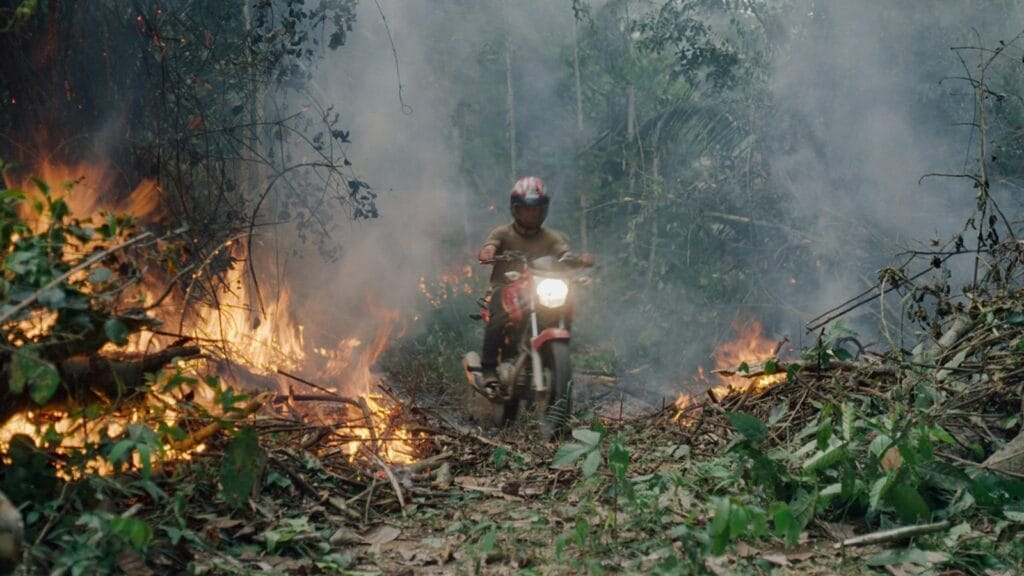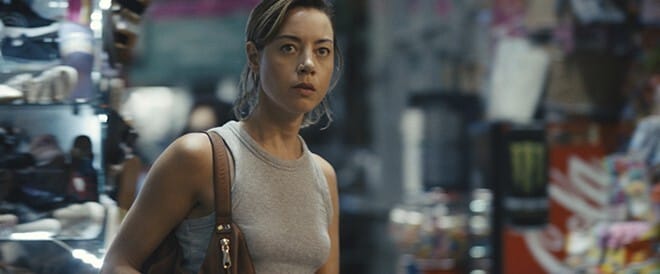Arthouse cinema-wise, the programming stars have aligned on this pre-Labor Day Weekend to bring local viewers a range of films within a common genre. From the Brazilian rainforest to a rural Chinese village to the streets of Los Angeles to a 1950s insane asylum, the films described below offer unique takes on social justice themes.
Can the subject of rainforest deforestation be given emotional heft? Alex Pritz’ gripping documentary “The Territory” shows it can be done when it’s tied to home protection. The film, which opens August 26, 2022 at the AMC Metreon 16 and the Smith Rafael Film Center, may leave you wanting to shoot a few arrows into the nearest illegal settler’s house.
Pritz’ film, which is co-directed by members of the Uru-eu-wau-wau tribe, follows a David vs. Goliath struggle over several years. To the Uru-eu-war-wau, the rainforest is their home and that forest land has been set aside for them. But to the white farmers and settlers illegally taking chainsaws to rainforest trees, not developing the land for farms and cattle is a waste of natural resources. When Brazil’s newly elected president, the Orange Skull-like Jair Bolsonaro, voices an openly anti-indigenous reserve policy, the intensity of Uru-eu-wau-wau vs. illegal settler struggle goes up to 11. The illegal settlers’ sense of impunity becomes such that they openly destroy a patch of rainforest and plan to steal more indigenous land through the courts…on camera.
“The Territory” distinguishes itself from baneful “both-sides” journalism. Viewers do learn the rationales of both the Uru-eu-wau-wau and the attempted land thieves for their actions. But Pritz’ film does not offer both-siderism’s complicity by silence. It doesn’t equate desires for economic betterment to protection of the home one has loved and grown up with. “The Territory” shows that beneath these encroachers’ aspirational euphemisms lie religiously-endowed entitlement and barely concealed racism.
Seeing the visual contrast between the ugliness of the developed land and the lushness of the rainforest will make the viewer contemptuous of these greedy white men who appear incapable of appreciating natural beauty. Seeing a line of ants carrying things bigger than themselves feels like a cartoon come to life. The restorative feel of a beautiful river will make a viewer understand why keeping that river pristine is something worth defending from settler theft. Any similarities between the struggle of the Uru-eu-wau-wau and the Palestinians against each group’s illegal settlers might be coincidence…or might not.

The Territory
“Benevolent” capitalism gets a well-deserved kick in the posterior in Fernando Leon de Aranoa’s “The Good Boss.” The Spanish dark comedy, which opens August 26 at the Opera Plaza Cinemas and the Smith Rafael Film Center, stars Javier Bardem as Blanco. His provincial Spanish company, Basculas Blanco, makes industrial scales. A committee is coming to visit Basculas Blanco to determine its worthiness for a Business Excellence award. Blanco races against the clock to make sure his company, which supposedly treats its workforce like family, looks its best for the committee’s evaluation. But how can the manager cover up the protest camp set up by a downsized ex-employee outside the Basculas Blanco factory? And will Blanco’s habitual seduction and dumping of his female employees come back to bite him hard?
The third edition of the Social and Economic Justice Film Festival runs August 26 & 27, 2022. As it’s all online, you don’t have to come to the City to attend it. Missed previous screenings of Jeff Adachi and Chihiro Wimbush’s acclaimed documentary “Ricochet?” You now have another chance on August 26 to see the film and even ask Wimbush questions about the film and the incidents depicted. For the new viewer, one day undocumented immigrant Jose Ines Garcia Zarate inadvertently fires a gun at Fisherman’s Wharf. The ricocheting bullet accidentally kills young white tourist Kate Steinle. The S.F. Public Defender’s efforts to defend Zarate from a murder charge gets complicated by right-wingers such as then-presidential candidate the Orange Skull publicly whipping up racist and anti-undocumented sentiment. This screening is also a fundraiser for the festival.
On August 27, the all-day film festival offers five feature films and a dozen shorts from around the world. Among the films being shown are: Gabriella Bacskai’s “Lemon Island,” a portrait of a Hungarian squatter community established in a former barracks; Maya Perusin Mysorekar’s “Une Lutte Enchantee (An Enchanted Fight)” which ties together the memories of an Argentinian activist and a Marseilles choir doing street performances supporting resistance movements; and Vinu Joseph’s “Civil War 2.0,” which features antifa activist Darryle Lamont Jenkins explaining why the Proud Boys are a fascist hate group.
(Disclosure: This writer serves on the committee that puts on the Social and Economic Justice Film Festival.)
“Free Chol Soo Lee” is still at the Roxie Theater. That’s the 1970s San Francisco-set documentary about the Korean-American man who wound up being imprisoned for a murder he didn’t commit thanks to both racial profiling and SFPD abuse.

Emily The Criminal
Also playing at the Roxie is John Patton Ford’s “Emily The Criminal.” Think having unpaid crushing student debt is bad? What do you do when you can’t get a job to pay off that debt thanks to a minor criminal record? Aubrey Plaza’s titular character is stuck in this situation until she becomes a dummy shopper, someone who buys goods with stolen credit cards. She winds up making more money in the world of black market capitalism. But what happens when Emily and partner Youcef decide to take their business to the next level?
At the Pacific Film Archive, the Samuel Fuller film series screens on August 27 one of Fuller’s more unusual films, “Shock Corridor.” Newspaper reporter Johnny Barrett goes undercover at an insane asylum to investigate the unsolved murder of an asylum inmate. However, the only witnesses to the crime are three inmates of questionable mental stability: a brainwashed GI, an emotionally broken Black activist, and a former nuclear physicist. As this story is set in the 1950s, Fuller implies America’s social ills of the period caused the mental breakdown of these men.
The Archive’s Film Foundation film series wraps up on August 26 & 27 with two films that demonstrate certain sociopolitical problems aren’t just unique to Bay Area residents. Jia Zhangke’s “Xiao Wu” is a small time pickpocket in a poor rural Chinese town. While the other citizens of Fenyang strive for economic success via demolition of decrepit buildings and enforcing quality of life crimes, Xiao Wu can only watch as he’s figuratively left behind. Economic exploitation of a country’s cultural history is the dilemma at the heart of Shadi Abdel Salam’s “Al Momia.” An Egyptian desert tribe has pledged to protect the tombs of the pharaohs. But what happens when the tribe’s only hope of survival is to raid and exploit the treasures of these same tombs?
The post Bay Cinema: Rainforest Defenders And 1950s Insane Asylum Inmates appeared first on Broke-Ass Stuart's Website.







